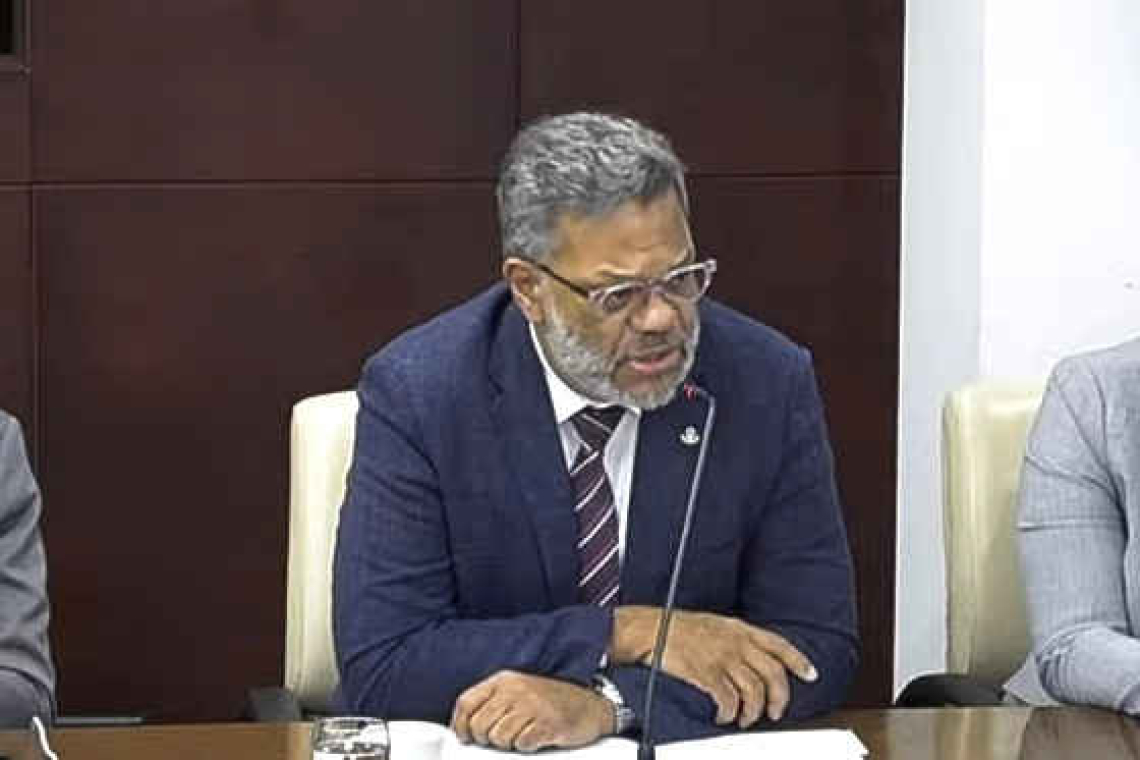Prime Minister Dr. Luc Mercelina in Parliament on Wednesday.
PHILIPSBURG--There are no recorded cases in St Maarten where an individual became stateless solely due to the loss of Dutch nationality through the Department of Civil Registry, Prime Minister Dr. Luc Mercelina told Members of Parliament (MPs) on Wednesday.
He said there were currently only three cases of statelessness in the basic administration of the Department of Civil Registry.
As it relates to these three stateless cases, the PM said in the first case, the individual voluntarily renounced their nationality after losing their Dutch nationality. He said there had been a court hearing, and the person lost the case.
In the second case, the individual failed to comply with the requirement to renounce their original nationality within six months of acquiring Dutch nationality. As a result, the Immigration and Naturalisation Department IND in the Netherlands issued a letter declaring that their Dutch nationality was considered never acquired. Following this, the individual renounced their original nationality, thereby becoming stateless.
In the third case, an individual submitted a fraudulent school certificate during the naturalisation process. Consequently, the IND revoked the granting of Dutch nationality. Since the individual had already renounced their previous nationality, they became stateless.
The Prime Minister provided the information during the continuation of a meeting of Parliament’s Committee of General Affairs in response to a question from National Alliance (NA) MP Egbert Doran, who said mention had been made that someone will not lose their nationality if it will make them stateless and indicating that he is aware of instances where persons have lost their nationality. The MP wanted to know what is done in cases like these.
He also said as St Maarten does not control nationality, and wanted to know what happens when persons lose their passport and identification cards.
The prime minister said in these cases, the Department of Civil registry, works closely with the Governor’s Cabinet, policy advisors, and the Justice Department. He stressed however, that the individuals involved must be willing to cooperate. He said that many cases have been resolved successfully thanks to the strong collaboration between these entities.
“It is important to note that there is no standardised policy for such situations, as each case is unique. In most instances, the individuals do not become stateless, but instead refuse to contact their respective authorities for assistance because they wish to retain Dutch nationality, which is not possible without their active involvement,” he explained.
“The department informs them that once they obtain a passport from their country of origin, they will receive the proper assistance through the immigration process and subsequently guide them in submitting their request to the Governor. It is a collaborative process that requires effort from both parties,” he said.
The prime minister said the Department of Civil Registry is of the opinion that an assessment should be conducted to determine the number of undocumented individuals on St Maarten (due to loss of nationality or statelessness). “The proposal is for this to be a collaborative effort between Immigration and the Department of Civil Registry to identify such cases. The Department of Civil Registry, as an execution department, is responsible for implementing policies, but does not have the authority to make policy decisions. The result of the mentioned assessment can indicate if an amnesty policy is needed.
“Currently, the question remains whether an amnesty policy is needed. Each case is unique, and in some instances, individuals may hold another nationality but are reluctant to contact their respective authorities,” said the prime minister.
In the meantime, the Department of the Civil Registry, in collaboration with the Governor’s Cabinet, is currently preparing to organise information sessions on Dutch nationality and the process of maintaining it.







